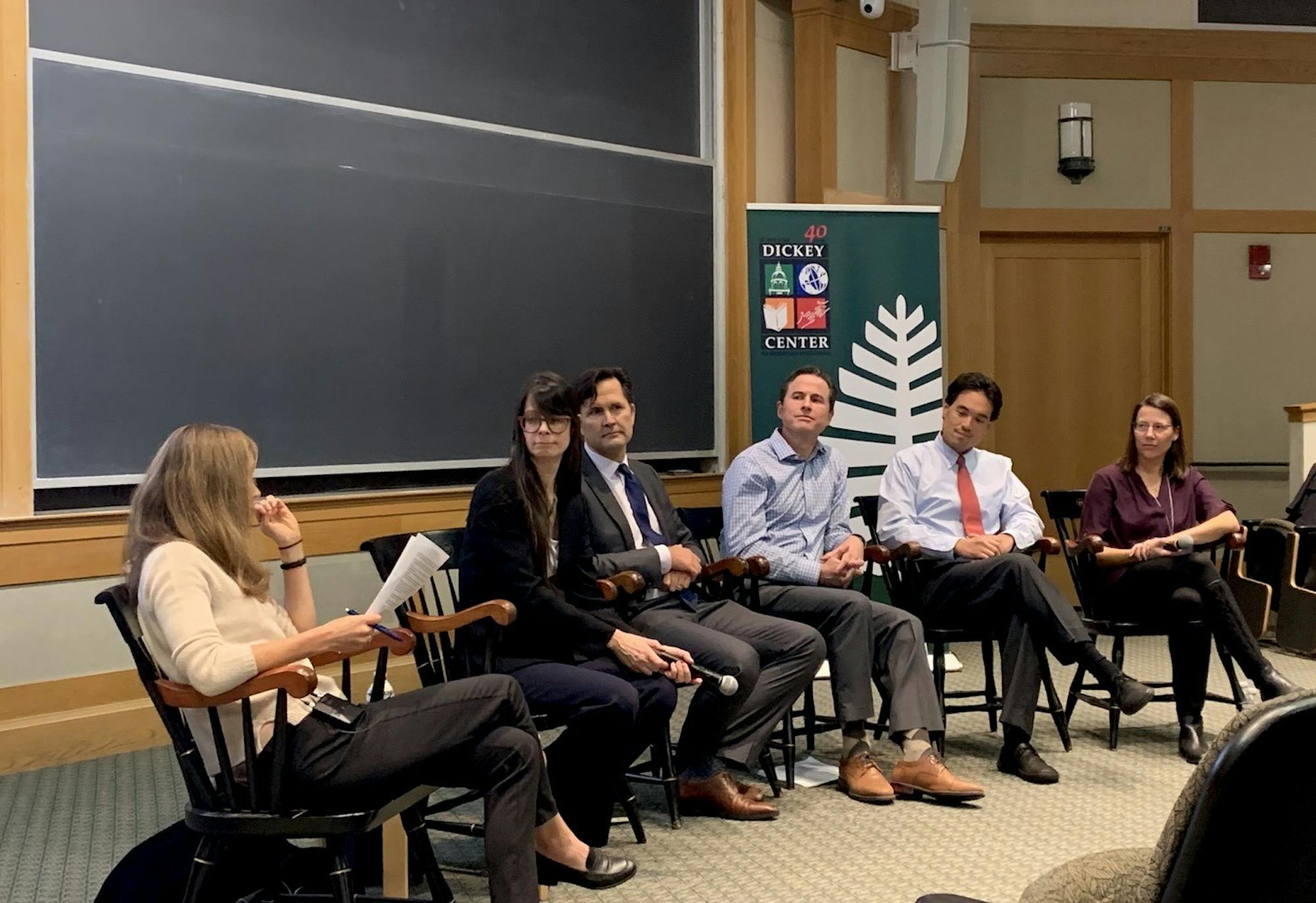Approximately 30 students, professors and community members gathered in the Filene Auditorium — alongside 75 online listeners — on Thursday evening to attend a panel discussion titled “Vaccine Hesitancy and Misinformation: Sources and Solutions.”
Hosted by the Dickey Center for International Understanding and the Center for Health Care at Tuck School of Business, the event included five experts on vaccines and misinformation and was moderated by Kendall Hoyt, faculty director for the Dickey Center’s Pandemic Security Project. The panelists covered topics including eroding vaccination rates, political polarization around vaccines, lack of trust in government institutions and ways to overcome these shortcomings.
Hoyt opened the event by providing context about COVID-19 vaccine uptake in the U.S., Europe and low-income countries, and vaccine misinformation and disinformation. She noted that COVID-19 vaccination rates have decreased significantly over time, resulting in continued high rates of COVID-19 deaths in unvaccinated individuals. In addition, she said misinformation and hesitancy around COVID-19 vaccines has decreased uptake rates of other vaccines. For example, polio was detected in the U.S. for the first time in a decade and a measles outbreak has taken the lives of hundreds of children in Zimbabwe in recent months.
“Taking the global perspective, UNICEF reported that due, in part, to large COVID disruptions, a lot of low and middle income countries have witnessed the largest backslide in routine immunization over the last 30 years,” Hoyt said at the event, before posing a series of questions to the panelists.
Gillian SteelFisher, a senior research scientist at the Harvard T.H. Chan School of Public Health, said that there are not just “two camps” or two opposing and polarized views regarding vaccines. She noted that instead, vaccine uptake falls on a “spectrum of behavior” and different beliefs that continue to change over time.
SteelFisher presented data based on her studies regarding the COVID-19 vaccine and “trust in authoritative sources and government” which revealed that 69% of people had some sort of trust in the Centers for Disease Control and Prevention. Additionally, according to SteelFisher, the reasons for reduced vaccination rates include a fear of long-term side effects, a belief that the first vaccine provides “enough protection” and a lack of trust in government, among others.
Thomas Bollyky, the director of the global health program at the Council on Foreign Relations, said that he studies the effect of political systems, economic inequality and government trust on vaccine uptake levels across the globe.
“What mattered is the trust you have in your government, and the trust you have in one another, and to a lesser extent, government corruption,” Bollyky said, referencing his research.
Brendan Nyhan, a government professor, said that mobilizing the education, healthcare and religious leaders that people trust can be a more effective approach to vaccine messaging than purely scientific explanations.
“It’s going to matter a lot more who’s delivering them [pro-vaccination messages] than what they’re saying,” he said. “In particular, focusing on the misperceptions out there may not be the most effective process.”
New Hampshire state epidemiologist Benjamin Chan spoke about the “politicization of public health,” which he argued has caused confusion about the vaccine. According to Chan, a variety of messengers from states and politicians without scientific backing have reduced public trust in both vaccines and government.
“It comes down to issues of trust and credibility, and whether people have trust in the messenger … and whether that person has credibility,” Chan said.
According to Lindsey Leininger, who directs the Center for Health Care at Tuck, successful vaccine messaging is about “the psychological undercurrent.” She added that people want to be heard and that vaccine messaging ought to lean toward the “power of personal connection” over a scientific approach.
David Leib, a microbiology and immunology professor at the Geisel School of Medicine, said he attended the event to better understand what stops people from being vaccinated, as someone who works in vaccines. Kim Meredith, a resident of Vermont, said she attended the panel for similar reasons.
“I know people who don’t believe in vaccination, and I don’t know how to talk to them,” Meredith said.
In an interview after the event, Dickey Center associate director for global health and development Dawn Carey said the panel did not expect or hope for vaccine opponents attending the talk to change their opinions. Instead, she said the panel’s aim was to help people understand the vaccine debate and have more informed conversations about vaccine hesitancy.




